 Advertising effectiveness is not what it was, marketing is confused. The industry is in crisis.
Advertising effectiveness is not what it was, marketing is confused. The industry is in crisis. At the same time, Public Relations is at a crossroads.
In communication, the number of pages of print has declined for the third year running and email, blogs, podcasts, Wiki's, IM, iTV (and up coming Internet Protocol TV) romp away.
The staples of PR practice like media relations are no where near as attractive as they were.
The revenue stream is moving in a different direction.
There are emergent practices like CSR rubbing shoulders with Reputation Management and ethics consultancy in an era of advisory. There is a confusion of communications channels and they require many different skill sets – and, though revenue rich, they are a moving target.
Inevitably this means that public relations practice will morph and change.
To be able to manage this change, there is an even greater need for practice to be grounded in good and ubiquitous theory. Just like medical doctors, accountant and lawyers, there is a need for the fundamentals to be in place.
Upon this foundation the industry can adopt the new processes and adapt to the emergent environment.
For many years, there has been a school of public relations that espoused a practice called 'relationship management'. In simple terms it is a practice that posits that public relations is about creating, sustaining and managing relationships between organisation and their publics.
From a grounded theory perspective this was always a non-starter. There is a presumption that organisations are a 'nexus of contracts'. Primarily founded in a Marxists (wealth is founded in production) paradigm, it has failed the information revolution where the greater part of corporate value is identified as intangible assets. In addition, there is the problem of what is meant by 'relationship'.
PR is predicated on these two pillars of shifting sand.
It is also free to take up a position as a professional practice as opposed to a craft service.
All of human society and all human evolution is based on relationships. Family, tribe, state, religion, civilisation, economies, local and national institutions are the bedrock of human endeavour. Now, that is a great landscape for the practice of public relations and it is our challenge to prove and exploit this opportunity.
It all begins with the initial research, an exploration for PR as daunting, exciting and exotic as the explorations of Marco Polo and the findings as exciting as Xuanadu, the capital of Kublai Khan' s empire.
Can we do it?
Yes we can!
(picture: Marco Polo)
Stock prices for newspapers are down 12 percent this year, advertising dollars are flowing from print to the Internet - Reuters
So far in 2005, mills have cut their newsprint production by 4.4%.
According to a recent survey ( Clear Content, 2005 ) conducted by Clear Context on email usage, the number of email users is increasing by millions everyday.
IDC expects the IM market to rocket from $315m in 2005 to $736m in 2009.
BT is upgrading its network to enable it to stream interactive television into customers’ homes over a two-way high-speed broadband internet connection providing services designed to appeal to ordinary television viewers as much as to computer buffs.
No comments:
Post a Comment